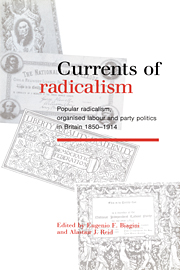 Currents of Radicalism
Currents of Radicalism Book contents
- Frontmatter
- Contents
- Notes on contributors
- Preface
- 1 Currents of radicalism, 1850–1914
- Part I Continuities in popular radicalism
- Part II The Liberal party and the people
- Part III Radicals, Liberals, and the Labour party
- 9 Labour and parliament: the Lib.-Labs. as the first working-class MPs, 1885–1906
- 10 Old Unionism reconsidered: the radicalism of Robert Knight, 1870–1900
- 11 Labour and local politics: radicalism, democracy and social reform, 1880–1914
- 12 Ideological debate in Edwardian Labour politics: radicalism, Revisionism and socialism
- Index
12 - Ideological debate in Edwardian Labour politics: radicalism, Revisionism and socialism
from Part III - Radicals, Liberals, and the Labour party
Published online by Cambridge University Press: 07 September 2010
- Frontmatter
- Contents
- Notes on contributors
- Preface
- 1 Currents of radicalism, 1850–1914
- Part I Continuities in popular radicalism
- Part II The Liberal party and the people
- Part III Radicals, Liberals, and the Labour party
- 9 Labour and parliament: the Lib.-Labs. as the first working-class MPs, 1885–1906
- 10 Old Unionism reconsidered: the radicalism of Robert Knight, 1870–1900
- 11 Labour and local politics: radicalism, democracy and social reform, 1880–1914
- 12 Ideological debate in Edwardian Labour politics: radicalism, Revisionism and socialism
- Index
Summary
Ideological debate within Edwardian labour and socialist politics is not a subject which has attracted a great deal of historical attention. Edwardian labour ideology has been dismissed by some as a defensive and simplistic creed because not socialist, (a factor which has hampered the study of social democracy in general). Others see the Labour party as the product of a muted sense of class consciousness, not of a Marxism which was unattractive given the social and economic realities of Edwardian Britain. For this second group Labour ideology was an irrelevance. Social and economic factors, and the ethos and aims of the trade unions which represented these forces, dominated Labour's outlook and its policy.
While historians have always noted the existence of Labour intellectuals, particularly the Fabians, other intellectual currents have not until recently been studied in depth (and Fabianism has been miscast or dismissed as politically unimportant). None the less, historians have now started to show that there were alternatives to a sectional, trade union created, ‘Labourism’, and that Labour intellectuals (the Webbs, R. H. Tawney, G. D. H. Cole) could develop sophisticated, in part competing, ideological and political arguments. Historians have also noted that many Labour activists were rooted in a radical, ethical critique of the existing order which developed in the 1890s, largely from within the radical Nonconformist tradition. Yet this ‘ethical socialism’ is still frequently dismissed as derivative and ideologically unsophisticated (like Fabianism), while the ideas of the more well-known Labour thinkers are dismissed as politically insignificant.
- Type
- Chapter
- Information
- Currents of RadicalismPopular Radicalism, Organised Labour and Party Politics in Britain, 1850–1914, pp. 271 - 293Publisher: Cambridge University PressPrint publication year: 1991
- 6
- Cited by
